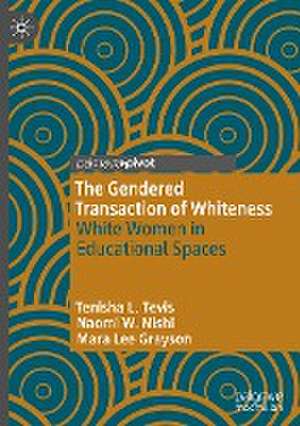The Gendered Transaction of Whiteness: White Women in Educational Spaces
Autor Tenisha L. Tevis, Naomi W. Nishi, Mara Lee Graysonen Limba Engleză Hardback – 30 dec 2023
Preț: 316.53 lei
Nou
Puncte Express: 475
Preț estimativ în valută:
60.57€ • 62.88$ • 50.51£
60.57€ • 62.88$ • 50.51£
Carte tipărită la comandă
Livrare economică 22 martie-05 aprilie
Preluare comenzi: 021 569.72.76
Specificații
ISBN-13: 9783031421303
ISBN-10: 3031421302
Pagini: 102
Ilustrații: XVI, 102 p.
Dimensiuni: 148 x 210 mm
Greutate: 0.3 kg
Ediția:1st ed. 2023
Editura: Springer International Publishing
Colecția Palgrave Macmillan
Locul publicării:Cham, Switzerland
ISBN-10: 3031421302
Pagini: 102
Ilustrații: XVI, 102 p.
Dimensiuni: 148 x 210 mm
Greutate: 0.3 kg
Ediția:1st ed. 2023
Editura: Springer International Publishing
Colecția Palgrave Macmillan
Locul publicării:Cham, Switzerland
Cuprins
Chapter 1. Introduction.- Chapter 2. Theoretical Perspectives on Whiteness.- Chapter 3. Transacting Whiteness through Pedagogy and Andragogy.- Chapter 4. Rituals of White Women in Social Justice Education.- Chapter 5. Where Do We Go From Here?: Possibilities and Responsibilities.
Notă biografică
Tenisha L. Tevis is Associate Professor of Adult and Higher Education in the College of Education at Oregon State University, USA.
Naomi W. Nishi currently serves as the Assistant Dean of Diversity, Equity, and Inclusion in the College of Veterinary Medicine and Biomedical Sciences at Colorado State University, USA.
Mara Lee Grayson is Associate Professor of English and Faculty Coordinator of General Education Assessment at California State University, Dominguez Hills, USA.
Naomi W. Nishi currently serves as the Assistant Dean of Diversity, Equity, and Inclusion in the College of Veterinary Medicine and Biomedical Sciences at Colorado State University, USA.
Mara Lee Grayson is Associate Professor of English and Faculty Coordinator of General Education Assessment at California State University, Dominguez Hills, USA.
Textul de pe ultima copertă
“This book invited us to consider the role of white women educators as they enact race-gendered power within a white patriarchal system that limits their own agency and authority…an invaluable call to critical reflection and action for white women and everyone who cares deeply about disrupting educational injustice.”
— Amanda Kibler, Oregon State University, USA
“The authors successfully balance interrogating systems—like whiteness—alongside individual habits that perpetuate violence, even in spaces focused on social justice…and to use the concepts detailed in this text to reflect, advocate, and act to disrupt paternalism and whiteness in service of equity and liberatory education.”
— Lauren N. Irwin, University of Tennessee, Knoxville, USA
“The strength of this text lies not only in the authors’ desire to illuminate how whiteness is transacted in educational contexts, but what might be done to challenge these everyday transactions.”
— Zak Foste, University of Kansas, USA
This book considers the causes and effects of an education field that remains white and gendered and critically examines how the race-gendered power afforded to white women in educational spaces is transacted through instructional practices and interpersonal interactions. White women occupy a complex position in society within systems of white supremacy and patriarchy, participating as both oppressors and oppressed. Emphasizing the consequences of whiteness for educational professionals and students of all racial identities, the chapters in this book offer strategies for identifying and moving beyond the gendered transaction of whiteness, including what white women can do instead and how all educators can work toward transformative antiracist education.
Tenisha L. Tevis is Associate Professor of Adult and Higher Education in the College of Education at Oregon State University, USA.
Naomi W. Nishi currently serves as the Assistant Dean of Diversity, Equity, and Inclusion in the College of Veterinary Medicine and Biomedical Sciences at Colorado State University, USA.
Mara Lee Grayson is Associate Professor of English and Faculty Coordinator of General Education Assessment at California State University, Dominguez Hills, USA.
— Amanda Kibler, Oregon State University, USA
“The authors successfully balance interrogating systems—like whiteness—alongside individual habits that perpetuate violence, even in spaces focused on social justice…and to use the concepts detailed in this text to reflect, advocate, and act to disrupt paternalism and whiteness in service of equity and liberatory education.”
— Lauren N. Irwin, University of Tennessee, Knoxville, USA
“The strength of this text lies not only in the authors’ desire to illuminate how whiteness is transacted in educational contexts, but what might be done to challenge these everyday transactions.”
— Zak Foste, University of Kansas, USA
This book considers the causes and effects of an education field that remains white and gendered and critically examines how the race-gendered power afforded to white women in educational spaces is transacted through instructional practices and interpersonal interactions. White women occupy a complex position in society within systems of white supremacy and patriarchy, participating as both oppressors and oppressed. Emphasizing the consequences of whiteness for educational professionals and students of all racial identities, the chapters in this book offer strategies for identifying and moving beyond the gendered transaction of whiteness, including what white women can do instead and how all educators can work toward transformative antiracist education.
Tenisha L. Tevis is Associate Professor of Adult and Higher Education in the College of Education at Oregon State University, USA.
Naomi W. Nishi currently serves as the Assistant Dean of Diversity, Equity, and Inclusion in the College of Veterinary Medicine and Biomedical Sciences at Colorado State University, USA.
Mara Lee Grayson is Associate Professor of English and Faculty Coordinator of General Education Assessment at California State University, Dominguez Hills, USA.
Caracteristici
Offers an interdisciplinary perspective from scholars of secondary and higher education Focuses on the pedagogical manifestations and implications of whiteness Addresses the limitations of the white fragility framework
